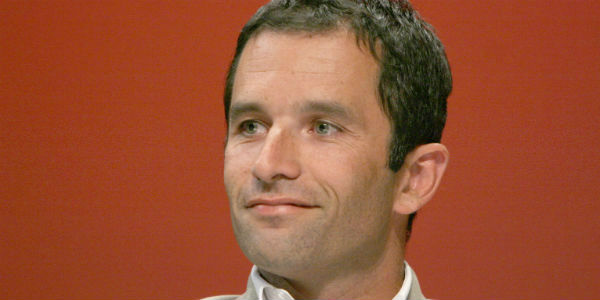Universal basic income and a tax on robots – the rise of French socialist candidate Benoît Hamon
A surge of enthusiasm for the left-wing French Socialist Party candidate Benoît Hamon could see him nominated as presidential candidate. Hamon wants a universal basic income and shorter working hours – policies that distinguish him from the other socialist candidates. Susan Milner says his main achievement may be to preserve the Parti Socialiste as a distinct force on the left – but like Jeremy Corbyn, he has a mountain to climb to win over the rest of the electorate.

Benoît Hamon. Photo: Philippe Grangeaud/ Solfe Communications/ Parti Socialiste via a CC-BY-NC-SA 2.0 licence
The French presidential campaign is certainly proving volatile and unpredictable. Following the November primary on the right, which saw François Fillon emerge from nowhere to win what had been touted as a Sarkozy-Juppé duel, Benoît Hamon topped the first round votes of the left primary, and may reasonably expect to benefit from vote transfers in the second round when he will face ex-prime-minister Manuel Valls. There is therefore a real prospect that the candidate from the left of the party could be anointed candidate after the second round on Sunday.
Hamon’s five-point lead in the first round over Valls is first and foremost a victory by default – that is, an expression of disaffection about President François Hollande’s record since 2012, rather than a positive sign of confidence in his own policies, performance, or ability to take on the right and the far right. Valls, who despite his association with Hollande’s presidency and his low levels of public support had managed to retain some loyalty within his party, has so far been unable to demonstrate policy innovation, and his campaign comes across as negative and, with its focus on immigration and border security, defensive.
In contrast, 49-year-old Hamon has presented a clear and focused message, as well as having the advantage of being a ‘challenger’ with relatively little governmental baggage. In fact he is a career politician with experience of supporting ministers in government, but only recently and for a limited time acting as minister himself – first for the third sector in 2012 and then for education following Valls’ appointment to the premiership in 2014. However, he and his close party collaborator Arnaud Montebourg was ejected from the government for insubordination shortly afterwards, and he then became the unofficial leader of the frondeurs or government critics within the PS. It is this opposition to government policies, particularly labour law reform, which has left him in a strong position for the 2017 elections: outspoken without at any point jeopardising the government’s parliamentary majority, the left of the party can claim some minor amendments to policy and also retain some limited credibility as a critical public voice.
If Hamon wins the primary, his opposition to labour law reform will ensure strong support on the left and draw him into conflict with all the other main candidates. In particular it will ensure a clear dividing line between the PS candidate and Emmanuel Macron, whose star continues to rise. Public opinion on labour law reform is highly divided and not always internally consistent. However, opposition to the 2016 law whilst popular with trade unionists and elsewhere on the left leaves Hamon exposed to accusations of being resistant to reform and jeopardising the competitiveness of the French economy.
In attacking his rival, Valls – who previously expressed interest in the idea – aligned himself with the right-wing criticism of minimum income on grounds of cost to taxpayers. The main debate between the two contenders, on 25 January, showed sharp disagreement between them on this key proposal, as well as on internal security, where Hamon stands accused of laxity having abstained on the vote to prolong the state of emergency. Both issues go right to the heart of the identity crisis in the PS – fundamentally challenged by immigration and law and order on one hand, and profoundly divided on how to go about reforming protection of work and employment. On the first point in particular, comparisons with Jeremy Corbyn’s Labour are inevitable.
On the question of work and employment, Hamon’s proposals deserve closer attention – not just because they are among the few new ideas in the campaign so far, but because they pose serious questions about the future of society. They start from the premise that the world of work is changing rapidly, not least because of robotisation, and that in future there will be fewer jobs and decreasing protection for workers. His eye-catching proposal to tax the use of robots attempts to address this, but he also advocates returning to support for reduced working time. In contrast, Macron and Valls want to enable companies to increase overtime.
Mr Hamon proposes introducing a means-tested universal income of 600 euros per month, rising potentially to 750 euros as suggested by an influential 2016 projection by the Jean Jaurès foundation which was taken up by the Senate. Replacing the much criticised Revenu Social d’Activité and other related benefits, it would cover young people aged between 18 and 25 who are currently excluded from social assistance. An experimental scheme just launched in the Gironde department has lent credence to the idea, and Mr Hamon’s proposal has been strongly defended by several leading economists such as Thomas Piketty and others. In Wednesday’s debate, Valls instead succeeded in turning attention away from those wider issues and the press picked up instead on the more technical question about how to fund a basic income through taxation, which seems in the short term to have shut down the wider debate.
Comment on the left primary has focused on what it shows about the weakness of the Socialist Party. Voter participation in the first round was low, fuelled no doubt by disillusionment after nearly five years of PS government, and discouraging poll results within the wider electorate. Opinion polls have put Mr Hamon at only 8% of voters’ preferences, but as he is much less known than other possible contenders his profile is set to rise with campaign exposure.
However, he is always going to be seen as a divisive figure. A Hamon victory on Sunday may help to revive the Socialist Party in the short term and see off any threat from the far left; it may also help to ensure that left ideas filter out into the mainstream during the campaign. But Hamon seems unlikely to be able to pull off the coup of appearing from nowhere to rout the far right. His main achievement may be to preserve the PS as a distinct ideational force, at the expense of its aspirations to be the main party of government.
This post represents the views of the author and not those of Democratic Audit.
 Susan Milner is Reader in European Politics at the University of Bath.
Susan Milner is Reader in European Politics at the University of Bath.





 Democratic Audit's core funding is provided by the Joseph Rowntree Charitable Trust. Additional funding is provided by the London School of Economics.
Democratic Audit's core funding is provided by the Joseph Rowntree Charitable Trust. Additional funding is provided by the London School of Economics.
[…] Hamon’s surprise victory in the left primary on Sunday has to some extent revitalised both the Socialist Party and the wider […]
Because the left has generally totally lost its confidence and has now been lashed to blind support for austerity by the EU and Berlin, it has to tinker on the edges with messy and uncosted solutions like these. The classic was People’s Quantitive Easing in the UK which got a relieved high five (yeah, finally!) from some on the left till it was made drily clear to its architects that they would be acting illegally (EU law)…and that clever ruses trying to trick the spirit of the law over People’s QE would simply attract endless litigation in which the courts would of course inevitably side with the EU and throw it all out. No wonder it sank without trace. Thus spaketh the EU and the Left Caveth In.
As long as the left acts like a right wing austerity enforcer (Greece has the most right wing government in the EU dressed in far left words-but-not-deeds, blindly ramming home the will of the EU in spite of being elected as a far left alternative to do the opposite), then it will simply shed votes by the millions. You cannot keep howling slogans about ‘the people’, coming up with little ruses and wheezes that solve nothing (mood music for the left, “but, please, no real action”) while patting the Austerity Elephant in the room on its trunk when M et Mme voter are not looking and planning to hoodwink them with sloganising and promises of small beer at the behest of your real bosses (not the voters, naturellement, but the eminences grises of Brussels and Berlin). As someone once said, when you are in a hole, someone needs to come along and kick away the shovel. It’s shame that the left appears to have no-one internally who will kick away the shovel so of course it will be done mightily for them by ‘other forces’.